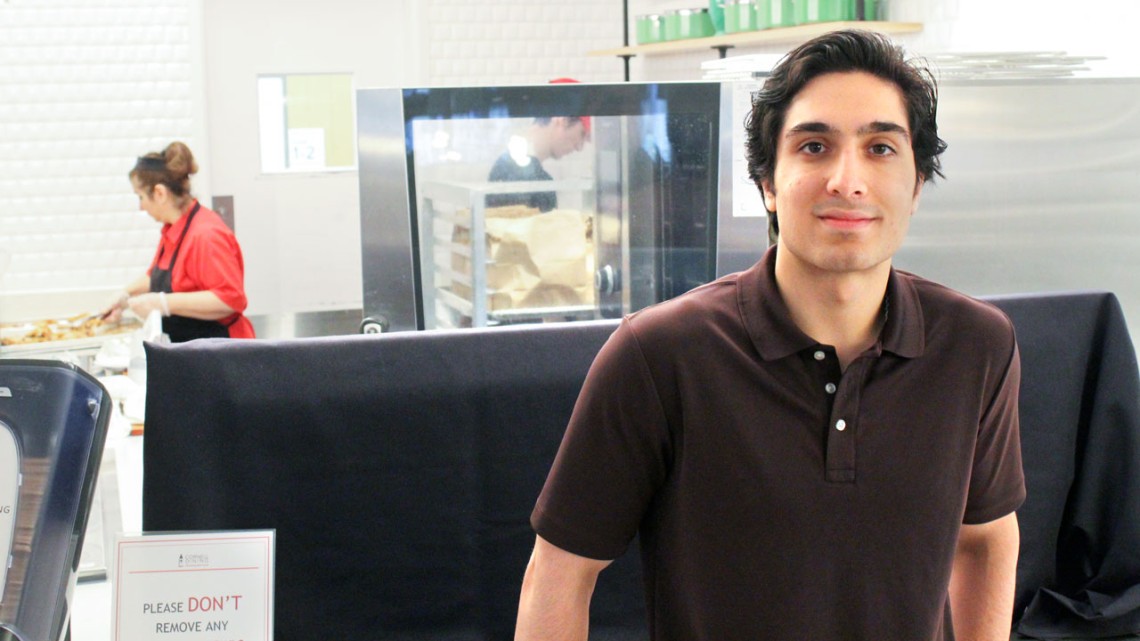
Mikhail Essa ’25 stands at the Halal Station at Morrison Dining on April 8.
Student input adds flavor, variety to halal, kosher meals
By Bryan Chambala
In fall 2022, Mikhail Essa ’24 was sure of one thing about Cornell’s halal food offerings: Everyone was tired of chicken thighs.
“Grilled chicken thighs seemed like all they had,” said Essa, a student in the Charles H. Dyson School of Applied Economics and Management.
Later that semester, Essa, who is Muslim, happened to walk by the yet-to-open Morrison Dining hall while a dining planning meeting was underway and went inside. That encounter led to extensive volunteer involvement with Cornell Dining: Essa offered to look for suppliers of halal food – meat prepared in accordance with Muslim law. Now, students can choose from a variety of types of halal chicken, beef and lamb, prepared in styles ranging from Moroccan to Indian.
“At Morrison you’ll see a huge line of students for halal – a lot of whom are not Muslim,” said Essa – one of several Muslim and Jewish students who provide guidance to dining staff for sourcing and serving both halal and kosher foods, improving variety, availability and taste. “Our goal is to continue to work with Cornell Dining retail services to get more kosher and halal food at retail locations on campus. The feedback has been so good, we know the demand is there.”
Cornell Dining serves more than 750 kosher and halal meals per week – in addition to regular kosher meals at the Center for Jewish Living and commissary items around campus. (Kosher foods are those prepared, served and eaten according to the requirements of Jewish law.) These foods serve Cornell’s Muslim and Jewish populations, as well as students who don’t adhere to those religions but just enjoy the additional options they provide.
“We meet and get feedback regularly from students in the Center of Jewish Living and Hillel,” said BJ Wojtowicz, Cornell Dining general manager. “The biggest conversation is managing opinions of flavor. We want to be helpful and keep that communication open. Food rules change. People’s tastes change. These students are dining with us every day, so those relationships are important.”
Wojtowicz said Cornell Dining also meets often with Muslim students, including Essa, to refine halal offerings. During Ramadan, which ends this week, Muslim students could select healthier pre-fast boxes – including granola bars with lower sugar content and more vegetable options – thanks in part to help from Samiha Azgar, a doctoral student in nutritional sciences, who worked with Cornell Dining staff to find the best ways to package halal food for distribution.
“Our feedback significantly contributes towards fostering cultural sensitivity within Cornell Dining’s offerings,” Azgar said. “The program also addresses college food insecurity amongst the Muslim community during Ramadan period.”
Cornell Dining’s onsite kosher kitchen at the Center for Jewish Living offers meals seven days a week, serving about 250 meals. Kosher and halal food is served at Morrison Dining, and halal food is available at Keeton Housing Dining Room. Later in April, Cornell Dining will also offer halal meals for pickup at Willard Straight Hall.
“Having grab-and-go halal options on central campus has been really well-received,” said Wojtowicz. “It’s a good example of student feedback guiding our offerings and helping us to be responsive.”
Cornell Dining hosts Friday Shabbat dinners at 104West! at the Center for Jewish Living, serving about 100 students. On holidays, the dinners can draw more than 400 participants, requiring a move to either Trillium or Robert Purcell dining halls.
Open to everyone, Wojtowicz believes the Shabbat meals help build community while also giving students and Cornell Dining the opportunity to introduce new recipes and flavors in a more intimate setting.
“Students will bring us recipes from their families or other places, and we try to filter them into our Shabbat dinners,” Wojtowicz said. “It’s a great way to introduce new flavors and ideas – and we have some more flexibility for the smaller dinners.”
That relationship with students means more to many Cornellians than just getting access to quality food according to religious traditions and guidelines.
“It shows us that they are committed to doing whatever they can to provide for the students’ wants and needs. They are always willing to listen to feedback on any menu item or broader change we would like to see happen,” said Benjamin Malekan ’25, a mechanical engineering student who is co-president of the Center for Jewish Living. “Dining halls are no longer an immutable part of my experience, but rather an experience where I can make my voice heard and speak on behalf of the community to enact real change.”
Bryan Chambala is a communications lead for Student and Campus Life.
Media Contact
Get Cornell news delivered right to your inbox.
Subscribe
